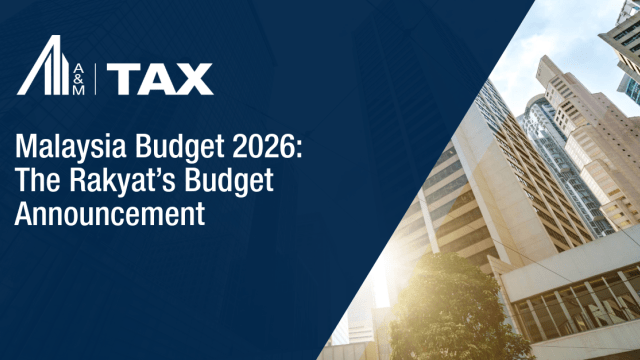A&M Tax Policy Insights – September 2025
Our Global Tax Policy and Controversy (TPC) Group at A&M Tax is pleased to launch the monthly newsletter, A&M Tax Policy Insights. This publication features expert insights from our team on select tax policy topics in the Editorial section, alongside curated global updates covering the latest developments in tax treaty, tariff, and broader global tax policy matters. For tax professionals and organizations, this newsletter serves as a valuable resource to stay informed on emerging trends, regulatory shifts, and strategic implications that may impact cross-border operations, compliance planning, and policy engagement. In this edition, our Editorial features evaluation of the future of Pillar Two under the proposed Side-by-Side system and its impact on Multinational Enterprises. Our Updates section covers key developments across policy (viz. Pillar Two, digital tax services, budget announcements, crypto taxation, etc.) and controversy across regions (South Korea Supreme Court ruling on patents registered outside Korea).
The G7 statement of late June 2025 may be a fundamental shift in global tax policy and mark a new era for Pillar Two.[1] While any final solution is subject to the consensus of all BEPS Inclusive Framework members, the July G20 communiqué reaffirmed some of the core principles of the G7 statement, which also include the need to achieve simplification in the administration and compliance of Pillar Two and the commitment to revisit the existing tax incentives framework.[2] The ripple effects of this solution may affect multinational enterprises (MNEs), their compliance strategies, and incentive structures across jurisdictions.
The Side-by-Side System: A Structural Shift and GILTI Reform by OBBBA
The Side-by-Side system (SbS system) proposes a full exclusion for US-parented multinational groups from the Income Inclusion Rule (IIR) and Undertaxed Profit Rule (UTPR) in respect of both domestic and foreign profits, simplifying compliance while maintaining global minimum tax alignment.
Concurrently, the US Congress passed the One Big Beautiful Bill Act (OBBBA), revamping Global Intangible Low-Taxed Income (GILTI) into Net Controlled Foreign Company (CFC) Tested Income (NCTI) –- with a reduced Foreign Tax Credit (FTC) haircut and elimination of the substance-based carve-out, raising the minimum foreign effective tax rate (ETR) to ~14%. (For further analysis on the OBBBA, see here.[3]) The proposed Section 899 (known as Revenge Tax) was removed from the OBBBA prior to its passing.
Broader Application?
It remains to be seen whether other major developed or developing economies will seek similar exemptions for their Ultimate Parent Entities (UPEs). The latest information appears to suggest that the Pillar Two exclusion may apply to any jurisdiction with an “eligible SbS regime,”[4] provided certain conditions are met. These include: (a) companies are subject to tax on a comprehensive measure of income at an agreed rate; (b) the parent company is subject to tax on the profits of its controlled foreign entities at an agreed rate; and (c) foreign tax credits are granted for Qualified Domestic Minimum Top-up Taxes (QDMTTs).[5] The coming months could prove pivotal, potentially reshaping the application of Pillar Two to accommodate the G7’s proposed SbS regime while addressing the concerns of other jurisdictions. Until these changes materialize, we examine below some of the key areas likely to be impacted.
Interaction Between NCTI and GloBE Rules
Current Position: The interaction between the NCTI and GloBE rules functions by treating the NCTI as a blended CFC tax. This allows CFC taxes to be “pushed down” to foreign subsidiaries, thereby affecting those subsidiaries’ GloBE ETR.[6] If, after this push-down, the ETR remains below 15%, the IIR may still apply, even for US-parented groups. Currently, a transitional safe harbor for UTPR provides temporary relief for UPEs located in high-tax jurisdictions (with a rate of ≥20%), but both the cross-border tax allocation mechanism and the UTPR safe harbor are set to expire at the end of 2025.[7]
Under the SbS System: Neither the IIR nor the UTPR would apply to US-parented groups. However, if a US intermediate parent is owned by a foreign UPE in a jurisdiction that applies the IIR, exposure to top-up tax may still arise. In such scenarios, the US intermediate parent would apply the NCTI rules to its foreign subsidiaries, and the resulting push-down allocation could reduce the ETR below 15%, triggering the IIR at the foreign UPE level. This exposure does not occur when the UPE is a US entity, where only the NCTI rules apply.
Primacy of the QDMTT: Regardless of group structure, the QDMTT takes precedence. Jurisdictions retain the right to impose the 15% minimum tax on low-taxed domestic profits before applying any other GloBE rules, preserving their sovereignty over domestic tax enforcement.
Next Steps?
Jurisdictions will now engage in detailed discussions to agree on the framework for the SbS system, along with related Pillar Two issues such as simplification measures and the treatment of tax incentives, which are addressed later in this newsletter.
These discussions (and negotiations) are unlikely to be straightforward. Several countries have expressed concerns that the proposed SbS system may disproportionately benefit US-headquartered groups, potentially disadvantaging non-US companies.[8] Given the current timeline, delays in finalizing the technical design of the SbS system may necessitate interim measures. One possible solution could be to extend both the transitional UTPR safe harbor and the simplified cross-border tax allocation framework by an additional year.
Simplifications
A key upcoming development from the OECD, is the anticipated introduction of a permanent safe harbor mechanism. While it remains uncertain whether this will be directly linked to Country-by-Country Reporting (CbCR), early indications suggest that it may provide greater flexibility in tax calculations. For example, MNEs could be permitted to make limited, rather than comprehensive, adjustments significantly reducing administrative complexity.
Tax Incentives: Qualified Refundable Tax Credits (QRTCs) and beyond?
From a strategic planning perspective, QRTCs present a valuable tool for improving the ETR without increasing the actual tax liability. This is because QRTCs affect the denominator of the ETR calculation rather than the numerator. Both the G7 statement and the G20 communiqué include a commitment to revisit the treatment of tax incentives. The G7 has called for greater alignment between refundable and nonrefundable tax credits, while the G20 has taken a broader stance, emphasizing the importance of substance-based tax incentives.
Although the final policy direction is still emerging, early signals point toward a growing emphasis on substance-based tax incentives, particularly in priority areas such as environmental sustainability and R&D. Jurisdictions like Malaysia and Singapore have already taken proactive steps to incorporate such measures into their tax regimes.
As the global tax incentive landscape shifts, MNEs may need to reassess their current incentive arrangements. In Singapore, for example, this could involve proactive engagement with regulatory authorities such as the Economic Development Board (EDB) to evaluate and adapt existing structures in line with emerging standards.
Key Takeaways
Ongoing Compliance and Anticipated Changes
MNEs must continue complying with the existing GloBE rules, which remain in force. The QDMTT remains the primary enforcement mechanism across all group structures, including under the proposed SbS system. The current NCTI-GloBE blended CFC framework is set to expire at the end of 2025. Meanwhile, further OECD guidance on the SbS approach is expected, subject to agreement within the BEPS Inclusive Framework. Discussions are expected to evolve in the coming months.
Strategic Assessment and Flexibility
MNEs should proactively evaluate how the SbS system may impact their structures, tax incentives and M&A activity. However, a “wait and watch” approach before committing to long-term incentive strategies allows flexibility as global guidance continues to evolve.
Operational Readiness
Companies should revisit tax models and upgrade technology infrastructure to prepare for simplified calculation regimes. They should also assess the implications for deal competitiveness and pricing strategies.
Conclusion
The G7’s proposed SbS system, along with anticipated OECD updates, signals a pivotal shift in international tax policy. While the goal is to simplify compliance and promote substance-based incentives, these changes introduce new considerations for planning and reporting.
To stay ahead, MNEs must remain agile, revisiting tax modelling, enhancing technological capabilities, and engaging with revenue authorities. Strategic adaptability will be essential to navigate this evolving landscape and align with the emerging international tax framework.
The A&M TPC team has curated a select set of global tax policy and controversy updates, categorized into Tax Treaty, Tariff, and general global developments, divided into regions for easy reference. This structured approach is aimed to ensure that stakeholders to stay informed on key international tax trends and regulatory shifts.
USA
September 2, 2025: Automatic Consent for Changes in Accounting Method for Domestic Research Expenses Under OBBBA Permitted by IRS[9]
The IRS has allowed automatic consent for taxpayers to change their accounting method for domestic research and experimental (R&E) expenditures under the One Big Beautiful Bill Act (OBBBA) amendments to IRC section 174. Starting with expenses incurred after December 31, 2024, taxpayers may immediately deduct domestic R&E costs or elect to capitalize and amortize them over at least 60 months under provisions of Section 174A. Small businesses can apply this change retroactively to expenses from December 31, 2021, with election due by July 6, 2026. Foreign R&E expenditures must still be amortized over 15 years. The IRS also allows extensions to file superseding returns applying the new rule for 2024 tax years ending before September 15, 2025. Most provisions take effect August 28, 2025, with transition rules for filings before November 15, 2025.
September 18, 2025: Michigan Permits Refunds for Flow-Through Entity Tax Paid Before OBBBA Changes[10]
The Michigan Department of Treasury has permitted taxpayers to request refunds for Flow-Through Entity (FTE) tax payments made before the OBBBA was enacted, responding to updates in State and Local Tax (SALT) deduction limits.
September 25, 2025: US Announces "Platinum Card" Visa for Extended Tax-Free Stay[11]
The US plans to launch a "Platinum Card" visa program allowing foreign nationals to stay up to 270 days in the country without being taxed on non-US income. Applicants must pay USD 5 million plus processing fees and pass Department of Homeland Security vetting. The announcement accompanied the launch of a "Gold Card" visa, aiming to promote commerce and raise more than USD 100 billion from visa programs and fees.
Canada
September 10, 2025: Canada Expands and Simplifies Voluntary Disclosures Program[12]
The Canada Revenue Agency (CRA) has updated the Voluntary Disclosures Program (VDP) starting October 1, 2025, making it easier for taxpayers to correct past filing errors. The revised VDP extends eligibility to those who receive CRA communications about a potential noncompliance, except for taxpayers already under audit or those who were deliberately noncompliant. Applications with no prior CRA contact are eligible for 75% interest relief and full penalty relief, while those after CRA contact are eligible for 25% interest relief and up to full penalty relief.
Poland
September 24, 2025: Simplified Reporting Rules Introduced for Polish Holding Companies Applying for CIT Exemption[13]
The Polish Upper House approved a bill amending the Corporate Income Tax (CIT) Law, removing the requirement for Polish Holding Companies (PSK) to submit a declaration of intent to apply the CIT exemption on income from share disposals. This change aims to reduce reporting burdens and simplify access to tax exemptions under the holding company regime, which previously required submission of the declaration at least five days before disposing of shares in domestic or foreign subsidiaries to unrelated entities.
Denmark
September 12, 2025: Amendments Introduced to Minimum Taxation for Pillar Two Alignment with OECD Guidance[14]
The 2026 Tax Plan introduces key amendments to the Minimum Taxation Act to align with OECD Pillar Two rules. Key changes include clarification on the treatment of securitization entities, updates on certain pre-transition deferred tax assets and liabilities from Effective Tax Rate (ETR) calculations, options for exclusion of certain deferred tax liabilities from calculation of covered taxes for five years, and interaction with international joint taxation.
Finland
September 12, 2025: Finland Proposes DAC9 Implementation From 2026[15]
The Finnish Ministry of Finance has opened consultations to implement EU Directive regarding DAC9 into the Finnish law, effective January 1, 2026. Under the directive, multinationals and large domestic groups must file a prescribed top-up tax information return to be compliant under the Minimum Taxation Directive.
September 12, 2025: Finland Proposes DAC8 Reporting Rules From 2026[16]
The Finnish Ministry of Finance has presented proposals to implement DAC8 reporting rules, effective January 1, 2026. Under updated rules, crypto-asset providers and intermediaries are required to report specified information, which will also be exchanged with EU Member states.
September 29, 2025: Draft Legislation Seeks to Tighten Regulation of Share-Exchange Deals[17]
The Finnish government proposed a law to amend tax rules on share exchanges between related parties. The proposal includes valuing transferred shares at their pre-exchange value for the purpose of tax-exempt dividend computation and capital gains. The rules also increase the maximum cash component in exchange transactions from 10% to 50% and extend tax-neutral exchange provisions to certain non-EEA companies meeting residency, tax treaty, and taxation level requirements. The new rules would generally apply with effect from January 1, 2026, but for valuation of all share exchanges carried out on or after January 1, 2017, they would also apply retroactively.
Romania
September 4, 2025: Romania Updates Minimum Taxation Rules[18]
Romania’s Government Ordinance No. 21/2025, effective September 1, 2025, updates Law No. 431/2023 to enhance the application of the EU Minimum Taxation Directive. Key changes introduce marketable transferable tax credits, permit carry-forward of excess negative tax expense, and refine the domestic top-up tax calculation. The ordinance also provides further information on safe harbor criteria for Qualified Domestic Minimum Top-up Tax (QDMTT) and extends the first-year notification deadline for designated entities to 12 months, among other things.
Germany
September 19, 2025: Germany Endorses Multilateral Competent Authority Agreement[19]
Germany has officially endorsed Multilateral Competent Authority Agreement (GIR MCAA) for exchanging GloBE information, a key component of the OECD/G20 Pillar Two framework. The agreement establishes a mechanism for the automatic exchange of GloBE Information Returns (GIRs) among participating jurisdictions and is recognized as a Competent Authority Agreement under the GloBE Model Rules. As of September 2025, 20 countries had signed the agreement, with more expected to follow.
Czech Republic
September 3, 2025: Czech Republic Extends Minimum Tax Filing Deadlines and Updates Size Criteria[20]
The Czech Republic has gazetted a bill amending its Minimum Tax Law for large multinational and domestic groups, retroactive to tax periods from December 31, 2023. The bill extends filing deadlines for the domestic top-up tax (from 10 to 22 months) and for the related information return (from 10 to 15 months, or 18 months for first filings). It also incorporates the Accounting Directive (2023/2775) to update size criteria for micro, small, medium, and large companies.
September 30, 2025: Czech Republic Abolishes Withholding Tax on Specified Employment Income[21]
The Czech Republic has gazetted the bill to remove withholding tax from certain employment-related payments, which is set to take effect from January 1, 2027. The package also includes complementary changes, such as enhanced R&D deductions and clarifications on ESOP taxation.
Belgium
September 3, 2025: Domestic Law Governs Beneficial-Owner Assessments for Withholding-Tax Exemptions, Belgian Court Rules[22]
The Brussels Court ruled that Belgium’s domestic law, rather than the EU Interest and Royalties Directive, governs eligibility for withholding tax exemptions on interest payments. Under Belgian domestic law, the term “entitled person” refers to the legal owner of the interest, not the economic beneficiary. Consequently, a Luxembourg joint venture receiving interest payments from a Belgian company was eligible for withholding tax exemption under domestic law despite not meeting the Directive’s beneficial ownership requirement. The Court also found no abuse of EU law or national GAAR, noting that the interest was taxed in Luxembourg and both entities had sufficient substance.
United Kingdom
September 3, 2025: HMRC Sets Out Rules for Enrolment and Filing Under Pillar Two Tax Regime[23]
Her Majesty’s Revenue and Customs (HMRC) set out operational guidance on who must register, when to register (within six months from the end of the first accounting period in which the registration criteria is met), and the filing deadlines for Pillar Two top-up taxes, including how the Income Inclusion Rule (IIR) and Undertaxed Payments Rule (UTPR) interact with domestic processes. The guidance also indicates initial filing windows and highlights possible penalties for late submissions.
Netherlands
September 17, 2025: Government Proposes to Amend Minimum Taxation and Introduces DAC9 Implementation Bill as Part of 2026 Tax Plan[24]
The Dutch government’s 2026 Tax Plan proposes changes to the Minimum Taxation Act for ensuring alignment with administrative guidance of the Inclusive Framework on Base Erosion and Profit Shifting, expanded definition of flow-through entities and clarification on adjusting deferred taxes and safe harbor. Further, the DAC9 bill aims to standardize top-up tax reporting across the EU, streamline filings for MNEs and large domestic groups, and facilitate information exchange among member states.
September 24, 2025: Updated Dutch Business Merger Decree 2025 Enhances Tax Treatment and Loss Carry-Forward Rules[25]
Decree No. 2025-219643, effective from September 25, 2025, has updated rules for business mergers under the Corporate Income Tax Act (CITA). Key updates, among other things, are clarification that confirmation of merger conditions under 14(2) will not imply compliance confirmation of tax avoidance under 14(4) as well, extension to cooperative mergers, prescribed conditions for automatic loss carry-forward, and streamlines approval processes.
India
September 4, 2025: 56th GST Council Meeting Recommends Key GST Rate Changes and Relief Measures[26]
The 56th GST Council meeting recommended significant GST rate rationalization. The Council approved a simpler two-rate structure—a standard rate of 18% and a merit rate of 5%, with a special demerit rate of 40% on select goods and services. Key reductions include GST cuts on essential items like hair oil, soaps, bicycles, food products, medical devices, and lifesaving medicines. The Council also announced operationalization of the GST Appellate Tribunal to enhance dispute resolution and facilitate ease of doing business. These reforms are aimed at providing relief and improving trade facilitation under GST, with implementation starting from September 22, 2025.
Hong Kong
September 25, 2025: IRD Initiates GloBE and Hong Kong Minimum Top-Up Tax Compliance Process for 2025[27]
The Hong Kong Inland Revenue Department has started issuing letters to multinational enterprise groups to identify those in scope for the Global Anti-Base Erosion (GloBE) Rules and Hong Kong Minimum Top-Up Tax (HKMTT), effective from fiscal years beginning on or after January 1, 2025. The IRD letter has requested taxpayers to confirm whether they belong to an in-scope MNE Group for 2025 fiscal year for GloBE Rules and HKMTT. If the group has annual consolidated revenue ≥ EUR 750 million in at least two of the last four fiscal years, it may be in scope for Income Inclusion Rule top-up tax, HKMTT, and mandatory electronic filing of profits tax returns from 2025/26 onward. The Group is required to assess whether it is in scope and if so, apply for MNE/JV codes, submit required notifications, and respond to the IRD within the prescribed timeline.
China
September 1, 2025: New Policy Guidelines on Value Added Tax (VAT) Refunds Issued by China[28]
China’s Ministry of Finance and State Taxation Administration has released Announcement No. 7 of 2025, updating the VAT refund policy effective from the September 2025 VAT filing period. The revised policy allows eligible taxpayers to apply for partial or full refunds of uncredited input VAT remaining at the end of filing periods. Full refunds are granted for taxpayers in manufacturing, scientific research and technology services, software and information technology, and ecological protection sectors. Real estate developers may claim a partial refund of 60% of increased uncredited input VAT under specified conditions. Further, taxpayers not specifically mentioned may claim a partial refund of 60% if their uncredited input VAT balance has increased for six consecutive months and exceeds CNY 500,000, with 30% refunded for amounts above CNY 100 million.
Thailand
September 11, 2025: Thailand Extends 7% Reduced VAT Rate to September 2026[29]
The Thai Cabinet has approved a draft Royal Decree to extend the reduced 7% VAT rate until September 30, 2026, as the current rate expires on September 30, 2025.
Sri Lanka
September 8, 2025: VAT on Nonresident Digital Service Providers in Sri Lanka Deferred to April 2026[30]
Sri Lanka has postponed the 18% VAT on digital services by nonresident providers from October 1, 2025, to April 1, 2026. The tax introduced under the VAT (Amendment) Act No. 4 of 2025, applies to services delivered via electronic platforms to Sri Lankan users.
September 12, 2025: Simplified VAT Regime Abolished in Sri Lanka Starting October 2025[31]
Sri Lanka will discontinue the Simplified VAT (SVAT) scheme from October 1, 2025, requiring all businesses to adopt the standard VAT system for better global alignment and simpler administration. Existing SVAT registrations will be cancelled and shifted to the standard VAT regime. Suppliers must charge VAT at the standard rate, and purchasers will pay VAT directly to suppliers.
South Korea
September 25, 2025: Supreme Court Reverses Three-Decade Precedent Governing Tax Framework for Royalties From Patents Registered Abroad[32]
In a landmark decision on September 18, 2025 (Case No. 2021Du59908), the Korean Supreme Court overturned its decades-old position on taxing royalties for patents not registered in Korea. Previously, only royalties for patents registered in Korea were treated as Korean-source income, based on the territoriality principle. The Court now held that, under the Korea-US tax treaty, “use of a patent” refers to the actual use of the technology such as in manufacturing or sales within Korea, regardless of where the patent is registered or where patent rights are exercised.
United Arab Emirates
September 24, 2025: UAE Ministry of Finance Seeks Public Input on Crypto-Asset Tax Transparency Framework[33]
The UAE Ministry of Finance (MoF) has invited public comments on the implementation of OECD’s Crypto-Asset Reporting Framework, particularly on its impact on stakeholders and areas where further guidance may be needed. As per the announcement, MoF is especially interested in input from businesses such as advisory service providers, broker-dealers, custodians, exchange platforms, and other stakeholders likely to be affected. The stated objective is: “[T]he consultation aims to gather insights and feedback from stakeholders on the proposed reporting framework to ensure its alignment with local market needs and international best practices. It also seeks to enhance transparency and compliance within the crypto-asset sector.” Feedback is open until November 8, 2025, with reporting set to begin in 2028.
September 26, 2025: UAE Clarifies Free Zone Tax Eligibility[34]
Ministerial Decision No. 229 of 2025 outlines the UAE’s criteria for the 0% corporate tax rate in Free Zones. Eligible activities include manufacturing, processing, commodity trading, holding of shares and securities, shipping, aircraft leasing and financing, fund management, reinsurance, wealth management, headquarter services, treasury functions, logistics services and distribution of goods from designated zones, and specified exclusions. Entities must limit non-qualifying income to below 5% of total revenue or AED 5 million and maintain audited financials. Noncompliance results in forfeiture of tax benefits for five years. The decision is effective retroactively from June 1, 2023.
September 30, 2025: Federal Tax Authority Issues Real Estate Valuation Framework[35]
The UAE Federal Tax Authority has issued Public Clarification CTP009, outlining guidance for real estate developers on how to calculate and exclude the portion of gains from property sales that relate to the period before the introduction of Corporate Tax.
September 30, 2025: Ministerial Decisions Released on the UAE Electronic Invoicing System[36]
The UAE Ministry of Finance (MoF) has issued Ministerial Decision No. 243 of 2025 on the Electronic Invoicing System and Ministerial Decision No. 244 of 2025 on its implementation, aimed at enhancing transparency, improving compliance, and aligning the UAE with global best practices in tax digitalization.
Please refer to detailed A&M tax alert[37]for more information on this.
Saudi Arabia
September 26, 2025: Saudi Arabia Proposes Regional Headquarters Licensing Framework[38]
Saudi Arabia has launched a public consultation on draft regulations governing the licensing and oversight of Regional Headquarters (RHQs) of multinational enterprises. The framework outlines mandatory as well as optional functions and provides for 30-year exemption (renewable) from corporate and withholding taxes, subject to maintaining a minimum of 15 employees, submitting annual reports, and demonstrating substantive operations. Noncompliance may result in license revocation and exclusion from government contracts.
Qatar
September 30, 2025: Qatar Set to Enact New Investment and PPP Legislation[39]
Qatar has initiated the drafting of two significant legislative frameworks: a new Investment Law and a Public-Private Partnership (PPP) Law. These initiatives aim to strengthen the country’s investment climate and foster collaboration between the public and private sectors.
Australia
September 2, 2025: Australia-New Zealand Tax Treaty Enhanced with Arbitration Memorandum[40]
On September 2, 2025, Australia and New Zealand signed a memorandum of arrangement to operationalize the arbitration mechanism under their tax treaty, as outlined in Part VI of the OECD Multilateral Convention (MLI) framework. The memorandum took effect immediately upon signing and provides a structured approach for resolving tax treaty disputes through arbitration. It outlines procedural rules for arbitration, including timelines, appointment of arbitrators, confidentiality obligations, and cost-sharing mechanisms.
September 4, 2025: Australia Introduces Treasury Laws Amendment Bill to Strengthen Financial Systems and Support Small Businesses[41]
The Australian government has presented the Treasury Laws Amendment (Strengthening Financial Systems and Other Measures) Bill 2025 to the Parliament, proposing reforms around corporate transparency, tax avoidance, and relief for small businesses. The bill sets out detailed beneficial ownership disclosure rules in line with Australia’s multinational tax integrity framework and global crime prevention standards, effective 12 months after the Royal Assent. It extends the AUD 20,000 instant asset write-off for small businesses with turnover under AUD 10 million, enabling full deductions for eligible assets until June 30, 2026. Additionally, it introduces technical updates to GST laws to strengthen compliance and align with international practices.
September 24, 2025: Tax Red Tape Under Review to Drive Business Efficiency[42]
The Australian Government initiated a new review aimed at simplifying the tax system and reducing the compliance load on businesses. Led by the non‑statutory advisory body Board of Taxation, the initiative aims to reduce red tape and streamline tax administration. The Board will engage with businesses and community stakeholders to uncover areas where tax processes can be made more efficient. As per the announcement, the Board will look for substantial, material, and measurable areas of red tape reduction that directly support productivity.
September 24, 2025: Guidelines on Capital Funded Distributions[43]
The Australian Taxation Office (ATO) issued Practical Compliance Guidelines, PCG 2025/3, outlining its approach to assessing the risk level of franked dividends funded through capital raising. This follows the introduction of section 207-159 to the Income Tax Assessment Act 1997 in 2023, which denies franking credits where distributions are funded through capital raised primarily to accelerate franking credit release. The Guidelines categorize the capital raising arrangements into three risk zones, white, green, and red, based on the likelihood of review. It outlines the criteria and indicators for assigning arrangements to specific risk zones along with requisite examples. Additionally, it specifies the conditions that must be met for a distribution to be treated as unfrankable. The Guidelines apply to distributions made on or after November 28, 2023.
- The U.S. Trade Representative (USTR) has temporarily extended 178 product exclusions from Section 301 tariffs on Chinese imports several times, with the current validity set to expire on November 29, 2025. USTR has invited public comments on whether any of these exclusions should be extended further. The comment portal will be open from September 16 to October 16, 2025.[44]
- Early September, the US Court of Appeals ruled that President Trump's "Liberation Day" tariffs exceeded authority under the International Emergency Economic Powers Act (IEEPA), striking down the broad tariffs on imports from several countries. President Trump subsequently petitioned the Supreme Court on September 3, 2025, to overturn the ruling, arguing that IEEPA’s power to "regulate importation" includes tariff authority. The Supreme Court granted certiorari on September 9, 2025, consolidating cases for expedited review with oral arguments scheduled for November 2025. The final decision will clarify presidential economic powers under national emergencies and the legality of these tariffs.[45]
- President Trump signed an Executive Order on September 4, 2025, implementing the US-Japan trade deal announced earlier in 2025, establishing a 15% tariff rate on Japanese imports retroactive from August 7, 2025, replacing the previous 35% “Liberation Day” tariff rate. The order removes tariffs on civilian aerospace goods, aluminium, copper, steel, automobiles, and automotive parts beyond the base rate.[46]
- The United States has formally imposed a 15% tariff on automobiles and auto parts imported from the European Union, effective retroactively from August 1, 2025. This measure, enacted by Executive Order 14346 and published jointly by the Commerce Department and the USTR, replaces earlier plans for a 30% tariff and is part of the recent US-EU trade framework to stabilize transatlantic trade in strategic sectors.[47]
Countries | Existing/New Treaty | Update |
Greece and UAE[48] | Existing | Exchange of notes signed on May 2, 2025; ratified by Greece on September 5, 2025, to ensure continued application of the 2010 Treaty. |
Hong Kong and Jordan[49] | New | Signed on September 4, 2025; once ratified and enforced, will replace paragraphs 1–7 of Article 9 of the 2004 Air Services Agreement. |
Egypt and UAE[50] | Existing | Amended protocol signed on February 11, 2024, now ratified by Egypt through Presidential Decree No. 211 of 2025, and published in Official Gazette No. 38 on September 18, 2025. |
Cameroon and Czech Republic[51] | Existing | Signed in 2023, enters into force from July 7 2025, and will apply from January 1, 2026, for withholding and other taxes. |
Australia and Ukraine[52] | New | Ukrainian Cabinet of Ministers approved the signing of an income tax treaty with Australia on September 17, 2025. |
India and Brazil[53] | Existing | Amended protocol signed on August 24, 2022, will enter into force on October 18, 2025. The protocol will apply from January 1, 2026, in Brazil and April 1, 2026, in India. |
Singapore and Brazil[54] | Existing | Amended protocol signed on April 17, 2023, now approved by Brazil on September 19, 2025, through Decree No. 203 and published in Official Gazette No. 180 on September 22, 2025. |
Sources
[1] G7 statement of June 28, 2025.
[2] G20 communique of July 18, 2025.
[3] https://www.alvarezandmarsal.com/thought-leadership/the-obbba-passed-now-what
[4] https://news.bloombergtax.com/daily-tax-report/oecd-proposes-changes-to-global-minimum-tax-deal-to-appease-us; https://www.taxnotes.com/featured-news/confidential-oecd-documents-outline-potential-pillar-2-changes/2025/08/29/7syzc
[5] Ibid.
[6] Article 2.10 of the OECD (2023), Tax Challenges Arising from the Digitalisation of the Economy – Administrative Guidance on the Global Anti-Base Erosion Model Rules (Pillar Two), OECD/G20 Inclusive Framework on BEPS, OECD, Paris.
[8] Bloomberg Tax, OECD’s ‘Side-by-Side’ Tax Deal for US Critiqued by 28 Countries, September 25, 2025.
[9] 26 CFR 601.204: Changes in accounting periods and in methods of accounting
[10] Flow-Through Entity Tax Election Relief in Light of One Big Beautiful Bill Act
[11] Trump Gold Card
[12] Made a mistake on your taxes? Upcoming changes to the Voluntary Disclosures Program - Canada.ca
[13] Paper no. 1441 - Sejm of the Republic of Poland
[15] Lausunto - Lausuntopalvelu
[16] Hallituksen esitys eduskunnalle
[17] HE 125/2025 vp
[18] Romania Updates Minimum Taxation Rules
[19] Signatories of the GIR MCAA
[20] Czech Republic Extends Minimum Tax Filing Deadlines and Updates Size Criteria
[21] Tisk 926 ve Sbírce zákonů
[22] MyMinfin
[23] Check if you need to report Pillar 2 Top-up Taxes - GOV.UK
[24] Belastingplan 2026 | Ministerie van Financiën - Rijksoverheid
[25] https://zoek.officielebekendmakingen.nl/stcrt-2025-31429.html
[26] https://www.pib.gov.in/PressReleseDetailm.aspx?PRID=2163555
[27] https://www.ird.gov.hk/eng/tax/bus_beps.htm
[28] https://fgk.chinatax.gov.cn/zcfgk/c102416/c5242450/content.html
[29] https://ratchakitcha.soc.go.th/documents/85959.pdf
[31] https://www.ird.gov.lk/en/sitepages/news%20and%20notices.aspx
[32] https://www.scourt.go.kr/portal/news/NewsViewAction.work?seqnum=10653&gubun=4&type=5
[33] Consultations - Ministry of Finance - United Arab Emirates
[34] EN-Ministerial-Decision-No.-229-of-2025-Regarding-Qualifying-Activities-and-Excluded-Activities.pdf
[35] tax.gov.ae
[36] Ministerial-Decision-No.-244-of-2025-on-the-Implementation-of-the-Electronic-Invoicing-System.pdf and
Ministerial-Decision-no.-243-of-2025-on-the-Electronic-Invoicing-System.pdf
[37] Pierre Arman et al., “Middle East Tax Alert | UAE |Timely insights into the Ministerial decisions released on the UAE Electronic Invoicing System (EIS),” Alvarez & Marsal, September 30, 2025.
[39] Qatar drafts PPP law update and foreign investment, bankruptcy law
[40] https://www.ato.gov.au/law/view/print?DocID=MOU%2FNZ&PiT=99991231235958
[41] Australia Introduces Treasury Laws Amendment Bill to Strengthen Financial Systems
[43] https://www.ato.gov.au/law/view/document?docid=COG/PCG20253/NAT/ATO/00001#H29
[45] Search - Supreme Court of the United States
[46] Implementing The United States–Japan Agreement – The White House
[49] Hong Kong and Jordan enter into tax pact (with photos)
[50] http://www.alamiria.com/Sec/TashTxt?id=Xd7M7XZ7N6M=
[51] https://www.mfcr.cz/en/eu-and-international-affairs/double-tax-agreements
[53] https://orbitax.com/news/country/article/Amending-Protocol-to-Tax-Treat-59992
[54] https://legis.senado.leg.br/norma/41490147/publicacao/41490426






